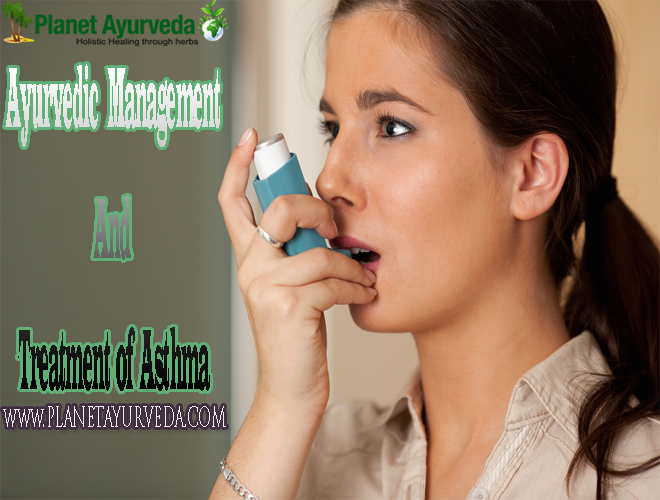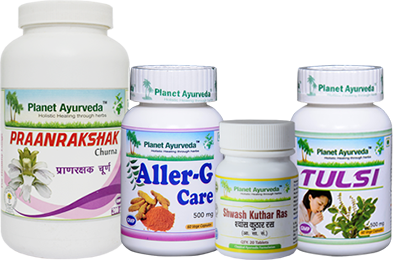Ayurvedic Management and Treatment of Asthma

We all will never know the value of our breath until we can’t breathe properly. So let’s discuss a very common disease known as Asthma in detail and its best treatment in Ayurveda. It is a chronic disease condition that causes breathing difficulty. In this disease inflammation of the air passage occur that makes your air passage narrower which carry oxygen to the lungs. When there will not be proper oxygen than it will result in shortness of the breath.
Asthma disturbs your life because without breathing properly we can’t live a normal andlonger life. In some people the condition is minor but in others, it may interfere withdaily activities and can prove to bea life-threatening condition. However, it is more common in children as compared to adults.
Now let’s discuss the Ayurvedic point of view of the asthma that is known as “Tamakshwas”. Tamakshwas comes under hikkashwaschikitsa that is the 17th chapter of Charaksamhita. Here are the two shlokas of Charak mentioned below in detail:.

These two shlokas are of tamakshwas (Asthma) that tells that when there is an obstruction in respiratory channels then aggravatedVata (air) moves in the opposite direction in the lungs. Neck, head struck down that aggravates Kapha and causes penus (nose) disease. Vata in the throat that is struck due to Kapha causes sound it causes an increase in the breathlessness. When breathlessness occurs in excess it causes a deformity in the body. Every time cough takes place with the sputum.

This shloka of charak states that clouds, water, cold environment, west air, and eating Kapha predominating food items cause an increase in cough. These all are responsible for tamakshwas (asthma). It will take some time for proper treatment. If tamakshwas (asthma) is from one year or less than one year in a person then treatment is easily done.

Signs and symptoms of an asthmatic patient:
The signs and symptoms of an asthmatic patient may vary from person to person.
- Pain in chest
- Tightness of chest
- Shortness of breath
- Cold and cough
- Excess sputum
- An asthmatic person may feel the wheezing or whistling sound while exhaling
- Difficulty in breathing
These signs and symptoms may flare up in certain conditions like:
- Airborne substances like pollen grains, cockroaches waste, spores, mold, particles of skin, or pet’s fur may trigger an asthma attack.
- Sometimes heavy exercise may trigger it.
- Inhalation of cold air, dust, gases and chemical fumes may cause the worst asthma attack.
- Stress and strong emotions
- There are certain medications that may worst your conditions like aspirin, beta-blockers, ibuprofen, and naproxen, etc.
- Strong acidic reflux is known as gastroesophageal reflux disease.
Few of the risk factors that may be a cause of asthma:
- Allergic conditions like allergic rhinitis or allergic dermatitis
- Genetic factor
- Being a chain smoker
- Being overweight
- Excess exposure to smoke, fumes, pollution, gases, or cold air
Ayurvedic Treatment and Management of Asthma:
Nature is the best way to heal a chronic as well as an acute health condition. As it has the power inside it to deal with every situation. In modern allopathic treatment, asthmatic patients are given inhalers and nebulizer to get relief for a short time. As this will not treat the disease from its root cause. If you want a proper and long term relief from asthma than you have to follow proper Ayurvedic treatment of Asthma with some change in your diet as well as lifestyle
As nature is full of various herbs that will clear and broaden your air passages. Hence, more oxygen will be carried to your lungs so that you can take a deep breath without any difficulty. Planet Ayurveda, one of the Best Ayurvedic Clinic that provides a natural herbal remedy known as “Asthma care pack” especially for asthmatic patients. This pack comprises of three products, i.e.Aller-G Care capsules, Tulsi capsules, and Praanrakshakchurna that are prepared from numerous herbs which will give good results in asthmatic patients.
Aller-G Care:
These herbal capsules are prepared from herbs like Haridra (Curcuma longa), Neem (Azadirachtaindica), Shirish (Albezzialebbock), and Ashwagandha (Withaniasomnifera) that shows anti-allergic, anti-inflammatory, and analgesic etc properties. These properties deal with all the signs and symptoms present in asthmatic patients like chest pain, shortness of breath, wheezing sound, etc.
These capsules build up a strong immunity in the body.
Dosage: One to two capsules twice daily half an hour after meals.
Praanrakshakchurna:
As the name, Praanrakshak suggests it helps in restoring the normal breathing. In asthma, as we know that healthy breathe is hampered This herbal formulation is prepared from various herbs like Shirish (Albizialebbeck), Anantamool (Tylphoraasthmatica), Bharangi (Clerodendrumserratum), Dalchini (Cinnamomumzeylanica), Madhuyashti (Glycrrhizaglabra), etc that in combination give wonderful results in asthmatic patients.
Dosage: One teaspoonful twice daily with lukewarm water half an hour after meals. You can also use it in decoction form by boiling one teaspoonful in 500 ml water until remaining 50ml. Strain the mixture and drink the decoction twice daily half an hour after meals.
Tulsi capsules:
The standardized extract of the herb Tulsi (Ocimumtenuiflorum) is used for capsules preparation. These capsules show antioxidant, analgesic, anti-inflammatory, and immune-modulator properties that helps in chest pain, shortness of breath, coughing, wheezing or whistling sound etc presenting asthmatic patient.
Dosage: One to two capsules twice daily half an hour after meals.
Shwas Kuthar Ras:
Shwash Kuthar Ras is a Herbo mineral classical formulation. This formulation is really effective in almost all the respiratory problems but has it’s best result in Asthma.
Dosage: 1 tablet twice daily with warm water after meals.
Some healthy tips for an asthmatic patient:
- Avoid drinking cold water.
- Avoid inhalation of smoke, chemicals, dust, and pollen grains.
- Avoid eating fried food, fast food, and processed items.
- Perform yoga poses like ardhmatsyendrasana, bhujangasana, sukhasana, upavisthakonasana, purvottanasana, shavasnana, sethubandhasana,
- To perform meditation and breathing exercises for at least half an hour daily.
- Totally avoid milk and milk products.
- Eat fresh fruits and vegetables that are rich in all nutrients.
- Always drink lukewarm water daily.
- Include whole grains and grams in your diet.






